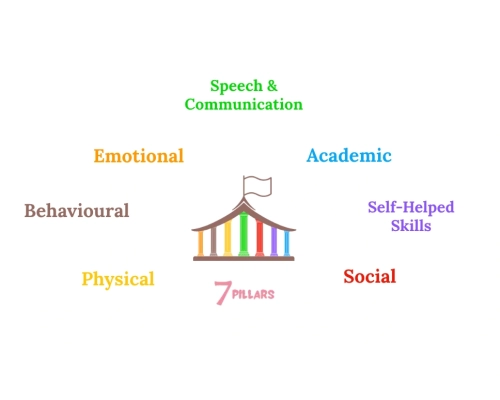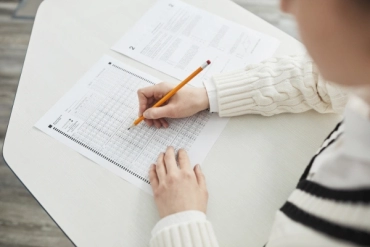Assessment by Our Child Psychologist
Designed by our expert Child Psychologist and Founder Grace Teo, our Assessment is specifically curated to identify learning gaps and areas for growth. This is done by grounding the assessment in the 7 Pillars of Growth for your child’s holistic development.
Our specialised support caters to children with ADHD, Autism, Dyslexia, Global Developmental Delay (GDD) and Down Syndrome. The assessments provide us with the expert insight needed to tailor personalised programmes to unlock your child’s full potential.
Assessment by our Child Psychologist, helps us to understand your considerations, goals, and priorities. This allows us to provide the most effective support for your specific situation.
Step 1: Profile
Your Personal Information
- Child Name
- Date of Birth
- Gender
- School
- Diagnosis
Step 2: Support
The 7 Pillars of Growth
- Behavioural
- Emotional
- Academic
- Self-help skills
- Social
- Physical
- Speech and Communication
Step 3: Assess
Our Key Findings
- Identify learning gaps
- Provide constructive feedback to caregivers
- Set realistic goals
- Tailor education plans
- Design early intervention for developmental delays
- Track progress
Step 4: Understand
Your Priorities And Concerns
- Plan programme structure
- Analyse child’s schedule
- Monitor child’s progress
- Set long-term goals
- Address logistical considerations
- Account for financial considerations
Step 5: Advise
Our Recommendations
- Personalised programme
- Active enrolment
- Progressive follow-ups
- Constructive feedback
Areas of Support – The 7 Pillars of Growth
Designed by our Child Psychologist

Behavioural
- Behavioural management (Anger / Anxiety / Impulsiveness)
- Self-regulation
- Attention and focus
- Oppositional defiant behaviour
- Understanding and following rules
Emotional
- Emotional awareness
- Emotional expression
- Emotional regulation (e.g. Anger management)
- Stress management
- Self-awareness
Academic
- Identifying learning style
- Imparting reading and writing skills (English + Chinese)
- Understanding mathematics (i.e. problem solving + calculation)
Self-Help
- Personal hygiene
- Daily life tasks (e.g. Eating / Dressing / Toilet Training)
- Time management
Social
- Peer relationships
- Social skills (i.e. understanding social cues)
- Empathy and cooperation
- Social Adjustment
Physical
- Gross motor skills
- Balance and coordination
- Strength and endurance
- Body awareness (spatial awareness of position and parts of the body)
- Fine motor skills
- Hand-eye coordination
- Finger dexterity (e.g. in buttoning and zipping up clothes)
- Grasping and pincer grips
Speech and Communication
- Articulation
- Fluency
- Comprehension
- Expressive language
- Adapting to language disorders
Assessment Outline*
Here’s a sample breakdown of how Step 3 could go, taking just one hour of your time:
*Note that this is a general outline and may be adjusted to adapt to the specific needs of each child.

Introduction and Interview (10 min)
- Brief introduction to child development and assessment
- Information gathering about concerns and goals for the child

Assessments (20 – 30 min)
- Administration of appropriate assessment tools tailored according to the child’s age and developmental level by our child psychologist

Dicussions (20 min)
- Explanation of assessment results by our child psychologist
- Feedback
- Understanding your priorities and concerns
- Discussion of potential areas for intervention

Questions and Answers (10 min)
- Clarification to address potential misunderstandings
- Additional support or resources to be offered as needed by our child psychologist
Assessment Tools
Ages and Stages Questionnaire (AEPS)
0 – 6 years old
- Screening tool to identify children who may have developmental delays
- Gather information about child’s development, concerns and goals
Vineland Adaptive Behaviour Scales (VABS)
0 – 18 years old
- Measures adaptive functioning, e.g. communication and social skills
Behaviour Assessment System for Children (BASC)
2 – 18 years old
- Comprehensive assessment of behavioural, social and emotional functioning
Woodcock Johnson IV Tests of Achievement (WRIT)
2 – 20 years old
- Standardised assessment of academic skill in reading, writing, mathematics, and oral language
Brigance Diagnostic Comprehensive Inventory of Basic Skills (DCBIS)
5 – 18 years old
- Standardised assessment of academic skill in reading, writing, mathematics, and oral language
Wechsler Intelligence Test for Children
6 – 16 years old
- Standardised assessment of verbal and performance intelligence in children




